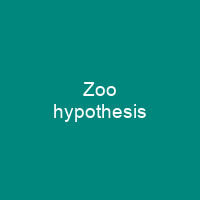The zoo hypothesis speculates on the assumed behavior and existence of technically advanced extraterrestrial life. It is one of many theoretical explanations for the Fermi paradox. One of its main interpretations is that it does so to allow for natural evolution and sociocultural development, avoiding interplanetary contamination.
About Zoo hypothesis in brief

Alternatively, a reluctance to initiate contact could reflect a sensible desire to minimize risk. If there is a plurality of alien cultures, however, this theory may break down under the uniformity of motive concept. It would take just a single extraterrestrial civilization to decide to act contrary to the imperative within our range of detection for it to be undone. The time between the emergence of the first civilization within the Milky Way and all subsequent civilizations could be enormous. Monte Carlo simulation shows the first few inter-arrival times between emergent civilizations would be similar in length to geologic epochs on Earth.
You want to know more about Zoo hypothesis?
This page is based on the article Zoo hypothesis published in Wikipedia (as of Dec. 29, 2020) and was automatically summarized using artificial intelligence.







